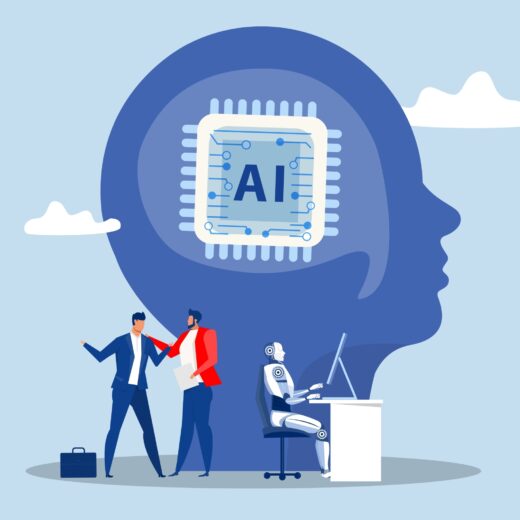Imagine a world where artificial intelligence seamlessly blends with digital marketing, transforming how businesses reach their audiences. The evolving landscape of SEO in the AI era presents exciting opportunities and challenges. As AI continues to advance, it’s reshaping search engine algorithms, enhancing our understanding of search intent, and introducing systems like AlphaRank. While AI offers powerful tools for optimizing digital strategies, the human element remains crucial in crafting content that resonates. In this dynamic environment, understanding the symbiotic relationship between AI and SEO is essential for navigating the future of digital marketing effectively.

The Evolution of SEO in the AI Era
As we delve into the evolution of SEO in the AI era, it’s clear that artificial intelligence is not just a buzzword but a transformative force in digital marketing.

AI’s Impact on Search Engine Algorithms
AI’s influence on search engine algorithms has been nothing short of revolutionary. With AI, search engines like Google can now process and analyze vast amounts of data at lightning speed. This advancement allows for more accurate and relevant search results, enhancing user satisfaction. Algorithms powered by AI can understand context, semantics, and user intent much better than before. This means that traditional SEO practices focused solely on keywords and backlinks must now incorporate AI-driven insights to remain effective.
Search engines are increasingly using AI to refine their algorithms. For example, Google’s RankBrain, an AI-driven component of their core algorithm, helps interpret complex queries and predict user behavior. This shift emphasizes the importance of creating high-quality, user-centric content that aligns with search intent rather than just focusing on keyword density.
Machine Learning in Search Intent Analysis
Machine learning, a subset of AI, plays a pivotal role in understanding search intent, which is crucial for crafting effective SEO strategies. By analyzing patterns in user behavior and search queries, machine learning algorithms can predict what users are looking for with remarkable accuracy. This allows marketers to tailor their content to meet specific user needs and expectations.
Search intent analysis is now more sophisticated, enabling businesses to create content that addresses user needs at various stages of the buyer journey. For instance, machine learning can differentiate between informational, navigational, and transactional queries, allowing for more targeted content creation. By understanding these nuances, businesses can optimize their digital marketing strategies to deliver content that resonates with their audience.
AlphaRank: Google’s AI-Powered Ranking System
Enter AlphaRank, Google’s cutting-edge AI-powered ranking system that takes search engine algorithms to the next level. AlphaRank leverages AI and machine learning to rank web pages based on their relevance, authority, and user engagement. This system not only evaluates traditional SEO factors but also considers the overall user experience, including page speed, mobile-friendliness, and content quality.
With AlphaRank, Google’s focus is on delivering the most relevant and high-quality results to users. This means that businesses need to prioritize creating comprehensive, engaging content that provides real value to users. The shift towards AI-driven ranking systems like AlphaRank underscores the need for a holistic approach to SEO that goes beyond traditional tactics.
In conclusion, the evolution of SEO in the AI era is marked by significant advancements in search engine algorithms, search intent analysis, and ranking systems like AlphaRank. As AI continues to reshape the digital marketing landscape, businesses must adapt their strategies to stay competitive and deliver exceptional user experiences.
AI & SEO: A Symbiotic Relationship
In today’s digital marketing landscape, the integration of AI into SEO practices has created a symbiotic relationship that enhances the effectiveness of both. Let’s explore how AI is transforming key aspects of SEO.

AI for Enhanced Keyword Research
Traditionally, keyword research has been a time-consuming process that required manual analysis and intuition. However, AI has revolutionized this aspect of SEO by providing tools that can analyze vast amounts of data quickly and accurately. AI-powered platforms can identify patterns and trends in search queries, enabling marketers to uncover high-performing keywords that might have been overlooked.
With AI, businesses can conduct more in-depth keyword research by understanding user intent and behavior. These insights allow marketers to focus on long-tail keywords and niche topics that align with their target audience’s interests. By leveraging AI, companies can enhance their keyword strategies, ensuring their content reaches the right people at the right time.
AI-Powered Content Optimization Techniques
Content optimization is another area where AI has made significant strides. AI tools can analyze existing content and suggest improvements to enhance readability, engagement, and SEO performance. These tools evaluate factors such as keyword density, sentence structure, and content length, providing actionable insights to optimize content effectively.
AI-powered tools can also generate content ideas by analyzing current trends and user preferences. This capability helps marketers create relevant and timely content that resonates with their audience. Moreover, AI can assist in personalizing content for different segments of the audience, increasing the likelihood of engagement and conversion.
Additionally, AI-driven tools can predict which content topics are likely to perform well, allowing marketers to focus their efforts on high-impact areas. By using AI for content optimization, businesses can improve their search rankings and deliver more value to their audience.
Automated SEO Audits & Performance Tracking
One of the most time-saving benefits of AI in SEO is the automation of audits and performance tracking. AI-powered tools can conduct comprehensive SEO audits, identifying issues such as broken links, duplicate content, and slow page speeds. These tools provide detailed reports and recommendations, enabling marketers to address problems promptly and efficiently.
Performance tracking is also enhanced by AI, which can analyze data from various sources to assess SEO effectiveness. AI tools can monitor changes in rankings, traffic, and user behavior, providing real-time insights into the success of SEO strategies. This data-driven approach allows marketers to make informed decisions and optimize their campaigns for better results.
By automating SEO audits and performance tracking, businesses can save time and resources while ensuring their digital marketing efforts are on the right track. AI’s ability to process and analyze large datasets quickly means that marketers can focus more on strategy and creativity, rather than getting bogged down by technical details.
In summary, the integration of AI into SEO practices has created a symbiotic relationship that enhances the capabilities of both. By leveraging AI for keyword research, content optimization, and automated audits, businesses can improve their SEO strategies and achieve better outcomes in the competitive digital marketing landscape.
The Human Touch: SEO Experts Remain Indispensable
While AI has undoubtedly transformed the digital marketing landscape, the human touch remains a critical component of effective SEO strategies. Let’s explore why SEO experts continue to be indispensable in the era of AI.

AI Insights for Strategic Decision Making
AI provides powerful insights by analyzing data at a scale and speed that humans simply cannot match. These insights are invaluable for informing strategic decisions in SEO. However, the interpretation of this data requires human expertise. SEO professionals have the experience and intuition to understand the nuances of AI-generated insights and apply them effectively to their strategies.
For instance, while AI can identify trends and patterns, it is the SEO expert who determines how these insights align with broader business goals and market conditions. By combining AI insights with their strategic vision, SEO professionals can craft campaigns that are both data-driven and aligned with the brand’s objectives.
Compelling Content that Resonates with Humans
Content remains king in the world of SEO, and creating content that resonates with human audiences is a task that requires creativity and empathy—qualities that are uniquely human. While AI can assist in content creation by providing data-driven suggestions and even generating basic content, it is the human touch that infuses content with personality, emotion, and storytelling.
SEO experts understand the importance of creating compelling narratives that engage and inspire audiences. They know how to craft messages that speak to the heart and mind of the reader, building connections and fostering trust. This ability to create authentic and meaningful content is something that AI, despite its advancements, cannot fully replicate.
Ethical Considerations in AI-Driven SEO
As AI becomes more integrated into SEO practices, ethical considerations become increasingly important. SEO experts play a crucial role in ensuring that AI is used responsibly and transparently. They must navigate the ethical challenges that arise from AI-driven SEO, such as data privacy, algorithmic bias, and the potential for manipulation.
SEO professionals are responsible for maintaining the integrity of their strategies and ensuring they align with ethical standards. This includes being transparent about the use of AI in marketing practices and safeguarding user data. By prioritizing ethics in AI-driven SEO, professionals can build trust with their audience and protect their brand’s reputation.
In conclusion, while AI offers powerful tools for enhancing SEO strategies, the human touch remains an indispensable element. SEO experts bring the creativity, empathy, and ethical considerations necessary to create meaningful connections with audiences and drive successful digital marketing campaigns. The future of SEO lies in the harmonious integration of AI and human expertise, working together to achieve outstanding results.
SEO Strategies for an AI-Dominated Landscape
As AI continues to reshape the digital marketing environment, SEO strategies must evolve to keep pace. Businesses need to adapt to an AI-dominated landscape by focusing on key areas that can enhance their online visibility and engagement.

User Experience & Engagement Metrics
In an AI-driven world, user experience (UX) has become a critical factor in SEO success. Search engines prioritize websites that offer seamless, enjoyable experiences to users. This means that businesses must focus on optimizing their sites for speed, mobile compatibility, and intuitive navigation.
Engagement metrics such as bounce rate, time on page, and click-through rate are increasingly influential in search rankings. AI tools can help analyze these metrics to identify areas for improvement. By enhancing UX, businesses can not only improve their SEO performance but also boost user satisfaction and conversion rates.
To optimize UX, consider the following steps:
– Responsive Design: Ensure your website is mobile-friendly and easily navigable on all devices.
– Fast Load Times: Optimize images, use efficient coding practices, and leverage caching to reduce load times.
– Clear Calls to Action: Design intuitive pathways for users to follow, encouraging engagement and conversion.
Voice Search & Conversational Queries Optimization
With the rise of voice-activated devices, optimizing for voice search and conversational queries has become essential. Voice searches tend to be more conversational and longer than traditional typed queries, which requires a different approach to SEO.
To optimize for voice search, focus on natural language and question-based content. AI tools can analyze user queries to identify common questions and phrases related to your industry. By incorporating these into your content, you can improve your chances of appearing in voice search results.
Consider these strategies for voice search optimization:
– Use Natural Language: Write content that mimics how people naturally speak.
– Focus on FAQs: Create content that answers common questions related to your products or services.
– Optimize for Local Search: Many voice searches are location-based, so ensure your local SEO is up to date.
Semantic SEO & Topic Clustering
Semantic SEO emphasizes the relationship between concepts rather than focusing solely on individual keywords. It involves creating content that addresses the broader context and meaning behind user queries. This approach aligns well with AI-driven search algorithms that prioritize content relevance and depth.
Topic clustering is a strategy that involves creating a group of interlinked pages centered around a core topic. This helps search engines understand the breadth and depth of your content, improving your site’s authority on the subject. By organizing content into clusters, businesses can enhance their SEO performance and provide more value to users.
Here’s how to implement semantic SEO and topic clustering:
1. Identify Core Topics: Choose key topics that align with your business goals and audience interests.
2. Create Pillar Content: Develop comprehensive, high-quality content that serves as the main resource for each topic.
3. Develop Cluster Content: Write supporting articles that delve into subtopics and link back to the pillar content.
In conclusion, adapting SEO strategies for an AI-dominated landscape involves focusing on user experience, optimizing for voice search, and embracing semantic SEO and topic clustering. By implementing these strategies, businesses can enhance their search visibility and deliver more value to their audience in the evolving digital marketing landscape.
The Future of Digital Marketing: AI & SEO Integration
As AI technologies continue to advance, the future of digital marketing is becoming increasingly intertwined with AI and SEO integration. This convergence promises to revolutionize how businesses engage with their audiences and optimize their online presence.

Predictive Analytics for Proactive SEO Campaigns
Predictive analytics, powered by AI, is set to become a cornerstone of proactive SEO campaigns. By analyzing historical data and identifying patterns, predictive analytics can forecast future trends and user behavior. This capability enables marketers to anticipate changes in search engine algorithms, consumer preferences, and market conditions.
With predictive analytics, businesses can create SEO strategies that are not only reactive but also proactive. This means being prepared for upcoming changes and trends, allowing for more agile and effective marketing campaigns. By leveraging predictive insights, marketers can optimize their content and outreach efforts to stay ahead of the competition.
To harness predictive analytics for SEO, consider the following approaches:
– Analyze Historical Data: Use AI tools to identify trends and patterns in past performance metrics.
– Forecast User Behavior: Predict shifts in consumer interests and search intentions to tailor your content strategy.
– Adapt to Algorithm Changes: Stay informed about potential search engine updates and adjust your SEO tactics accordingly.
AI-Driven User Experiences & Personalization at Scale
One of the most significant benefits of AI integration in digital marketing is the ability to deliver highly personalized user experiences at scale. AI algorithms can analyze user data to understand individual preferences, behaviors, and needs. This information allows marketers to create tailored content and experiences that resonate with each user.
Personalization goes beyond addressing users by their names in emails. It involves delivering relevant content, product recommendations, and offers based on individual user profiles. AI-driven personalization can enhance user satisfaction, engagement, and conversion rates, leading to greater brand loyalty.
Key strategies for implementing AI-driven personalization include:
– Dynamic Content Delivery: Use AI to serve personalized content and product suggestions based on user interactions.
– Behavioral Targeting: Analyze user behavior to segment audiences and deliver tailored marketing messages.
– A/B Testing: Continuously test and refine personalized experiences to optimize performance.
SEO & Other Digital Marketing Channels Convergence
The integration of AI and SEO is leading to the convergence of various digital marketing channels. SEO is no longer a standalone practice but an integral part of a holistic digital marketing strategy. AI enables seamless integration between SEO, social media, email marketing, and paid advertising, creating a cohesive brand experience across all touchpoints.
This convergence allows businesses to leverage data and insights from multiple channels to enhance their SEO efforts. For example, social media insights can inform keyword strategies, while email marketing data can provide valuable information about user preferences and behavior.
To achieve seamless integration, marketers should focus on the following:
– Cross-Channel Data Analysis: Use AI to analyze data from different marketing channels and identify synergies.
– Integrated Campaigns: Develop marketing campaigns that leverage the strengths of each channel to amplify your message.
– Consistent Branding: Ensure a unified brand voice and message across all digital platforms.
In summary, the future of digital marketing lies in the integration of AI and SEO, enabling predictive analytics, personalized user experiences, and the convergence of various marketing channels. By embracing these advancements, businesses can enhance their digital marketing strategies and deliver exceptional value to their audiences in an increasingly competitive landscape.